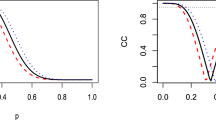Abstract
This paper discusses the Bayesian updating rules of ordinary and Jeffrey conditionalisation. Their justification has been a topic of interest for the last quarter century, and several strategies proposed. None has been accepted as conclusive, and it is argued here that this is for a good reason; for by extending the domain of the probability function to include propositions describing the agent's present and future degrees of belief one can systematically generate a class of counterexamples to the rules. Dynamic Dutch Book and other arguments for them are examined critically. A concluding discussion attempts to put these results in perspective within the Bayesian approach.
Similar content being viewed by others
References
ArmendtB.: 1980, ‘Is There a Dutch Book Argument for Probability Kinematics?’, Philosophy of Science 47, 583–589.
ChiharaC.: 1994, ‘The Howson-Urbach Proofs of Bayesian Principles’, in E.Eells and B.Skyrms (eds.), Probability and Conditionals, Cambridge: Cambridge University Press, pp. 161–179.
deFinettiB.: 1937, ‘Foresight, its Logical Laws, its Subjective Sources’, in H.Kyburg and H.Smokler (eds.), Studies in Subjective Probability, New York: John Wiley (1964), pp. 97–158.
DiaconisP. and ZabellS.: 1982, ‘Updating Subjective Probability’, Journal of the American Statistical Association, 77, 822–830.
EarmanJ.: 1992, Bayes or Bust?, Cambridge, Mass.: MIT Press.
EellsE.: 1982, Rational Decision and Causality, Cambridge: Cambridge University Press.
GoodI. J.: 1967, ‘On the Principle of Total Evidence’, British Journal for the Philosophy of Science 17, 319–321.
HackingI.: 1967, ‘Slightly More Realistic Personal Probability’, Philosophy of Science 34, 311–325.
HalmosP.: 1950, Measure Theory, New York: Van Nostrand.
HowsonC. and UrbachP.: 1993, Scientific Reasoning: the Bayesian Approach (second edition), Chicago: Open Court.
JeffreyR. C.: 1983, The Logic of Decision (second edition), Chicago: University of Chicago Press.
LewisD.: 1975, ‘The Probabilities of Conditionals and Conditional Probabilities’, The Philosophical Review LXXXV 297–315.
RamseyF. P.: 1926, ‘Truth and Probability’, In R.Braithwaite (ed.), The Foundations of Mathematics and Other Logical Essays, London: Kegan Paul, pp. 156–198.
TellerP.: 1973, ‘Conditionalisation and Observation’, Synthese 26, 218–258.
vanFraassenB. C.: 1984, ‘Belief and the Will’, Journal of Philosophy 81, 235–256.
vanFraassenB. C.: 1989, Laws and Symmetry, Oxford: Oxford University Press.
WilliamsP. M.: 1980, ‘Bayesian Conditionalisation and the Principle of Minimum Information’, British Journal for the Philosophy of Science 31, 131–144.
Author information
Authors and Affiliations
Additional information
This paper was completed with assistance from a Mind Association Fellowship. I would like to thank the Mind Association, and also Paul Castell for his patient advice on previous drafts.
Rights and permissions
About this article
Cite this article
Howson, C. Bayesian rules of updating. Erkenntnis 45, 195–208 (1996). https://doi.org/10.1007/BF00276790
Issue Date:
DOI: https://doi.org/10.1007/BF00276790




